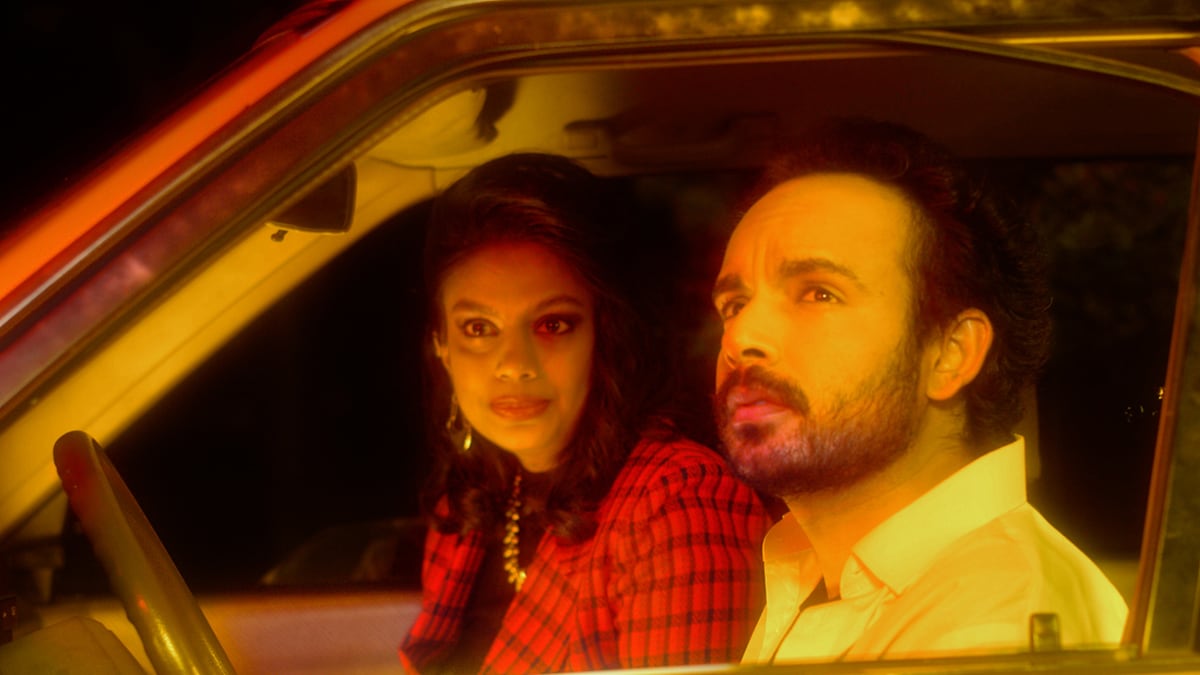Going to McDonald’s on a first date could be many things—an emergency, a joke, a practicality play, a humble suggestion to focus on one’s partner rather than the surroundings.
Yet in filmmaker Ali Godil’s debut, American-istan, the meaning of a Portland McDonald’s to a freshly immigrated Pakistani couple runs deeper still. For decades before the writer-director thought of fictionalizing his parents’ first date beneath the Golden Arches on film, dimensions of class, imperialism and alienation cemented the incident in his mind.
“When I first heard the story, I thought it was interesting because of the layers,” says Godil, whose film plays at the Oregon Short Film Festival on May 28 and the Brooklyn Film Festival on June 3-12 (where it will be available virtually).
In the vibrant, genre-hopping six minutes of American-istan, a young couple—Salim (Ricki Bhullar) and Iman (Esha More)—are practically strangers when they meet near Portland International Airport.
As Godil’s parents did at the time, Iman and Salim have an arranged marriage, and she’s joining her husband in the U.S. The film pivots from period comedy to romantic reverie to intimate human drama, as Salim and Iman navigate their expectations for new love in a strange land. (Spoiler alert: Iman is not expecting McDonald’s.)
Godil’s parents “were really touched” by the film when they attended its premiere at the Hollywood Theatre on April 1, but their son won’t soon forget the first-date story’s emotional edges.
“My dad, when he tells it, was joking and playing it off,” Godil remembers. “My mom comes in and she’s like, ‘Oh, he tricked me. I got all dressed up and then he took me to McDonald’s.’ She felt betrayed and hurt.”
Both symbolically and stylistically substantive, American-istan is an assured debut. Godil says he’s trying to follow in the footsteps of Indian filmmaking icon Satyajit Ray, not only because they both started their careers in advertising, but because Ray’s Pather Panchali (the groundbreaking social-realist film from 1955) helped inspire American-istan’s observant approach to drama.
Godil also nods to Wong Kar-wai’s In the Mood for Love, mirroring its intense commitment to seduction and color—in this case, golds and red that evoke passion and prosperity (and McDonald’s).
Other influences stem from the director’s moviegoing history with his family—specifically, monthly visits to Cinemagic’s Bollywood screenings during his youth. Godil’s family would often delight in seeing ‘90s Bollywood classics like Dilwale Dulhania Le Jayenge on the heels of family dinner at the Bombay Cricket Club. “We’d make a cultural experience out of it,” he says.
So it was meaningful for Godil to feature versions of his parents idyllically locking eyes across a verdant field, an homage to a classic scene from Dilwale Dulhania Le Jayenge between Shah Rukh Khan and Kajol.
In American-istan, the dreamy moment occurs with the PDX air traffic tower piercing the background—and arrives between a darkly comedic reference to racist airport security and a poetic verse borrowed from Muhammad Iqbal. Godil says his intuition told him these seemingly disparate pieces would fit.
“You can taste when flavors will work together,” Godil says. “Because of my background in design and film and [photography], I can tell when styles can complement each other and not clash.”
Perfecting the flavors of American-istan meant turning back the clock 35 years on Portland. In addition to era-appropriate costumes, music and a yellow Toyota Corolla hatchback, Godil’s crew needed a McDonald’s that time forgot. Thankfully, a Swan Island location had somehow eluded decades of remodeling and had no issue with its parking lot being used as a film set until 1 am.
Three months after shooting, the location closed. “It was the last stand of this McDonald’s,” Godil says. “All the other ones would’ve blown the period piece.”
Though he has cinephilic allegiances that range from Andrei Tarkovsky to Wes Anderson, filmmaking is still a relatively new frontier for Godil, who has operated his creative studio House of Gül since 2014 and produced work for Netflix, Facebook and the city of Portland.
He’s currently working on a second film (a feature, he hopes), focused on the experience of Afghan immigrants to the U.S. Inspired in part by stories from his in-laws, that project is still in its “frantic” early stages, but promises to continue parsing and humanizing the distinct perspectives too often shoveled into a generality like “the immigrant experience.”
For Godil, specifics matter. The final scene of American-istan depicts Salim and Iman shaking their hips to ‘80s Latin bop on the radio, speculating on the lyrics’ meaning. They don’t know Spanish, but there’s a comfort in so many disparate components arriving in one place—even if that place is a Swan Island McDonald’s.
“They’re eating a German hamburger, listening to Spanish music,” Godil says. “Two South Asians in a Japanese car.”
Read about all Five filmmakers who are reshaping the cinema of the Pacific Northwest here!
